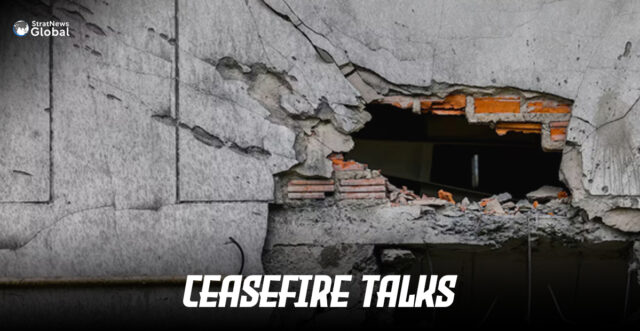Cambodia’s Prime Minister stated that the goal of Monday’s talks with Thailand is to secure an immediate ceasefire in the deadly border dispute, but his Thai counterpart expressed doubts about Cambodia’s sincerity ahead of the negotiations set to take place in Malaysia.
Monday’s talks to end the deadliest fighting in more than a decade between the Southeast Asian neighbours are being hosted by Malaysia, the chair of the regional ASEAN bloc.
Cambodian Prime Minister Hun Manet said the talks were co-organised by the United States and that China would also take part in them.
Border Clashes Continue
Both Thailand and Cambodia accuse the other of starting the hostilities last week and then escalating them. On Monday, officials from both countries said clashes along the disputed border were ongoing ahead of the talks later in the day.
“We are not confident in Cambodia, their actions so far have reflected insincerity in solving the problem,” acting Thai Prime Minister Phumtham Wechayachai told reporters ahead of his departure for Kuala Lumpur.
“Cambodia has violated international law, but everybody wants to see peace. Nobody wants to see violence that affects civilians.”
Cambodia has strongly denied Thai accusations it has fired at civilian targets, and has instead said that Thailand has put innocent lives at risk. It has called for the international community to condemn Thailand’s aggression against it.
“The purpose of this meeting is to achieve an immediate ‘ceasefire’, initiated by President Donald Trump and agreed to by the Prime Ministers of Cambodia and Thailand,” Hun Manet said in a post on X as he departed for the talks.
U.S. Secretary of State Marco Rubio said State Department officials would assist the peace efforts, after President Donald Trump had earlier said that he thought both leaders wanted to settle the conflict.
The tensions between Thailand and Cambodia have intensified since the killing in late May of a Cambodian soldier during a brief skirmish.
Border troops on both sides were reinforced amid a full-blown diplomatic crisis that brought Thailand’s fragile coalition government to the brink of collapse.
Malaysia-Proposed Talks
Malaysian Prime Minister Anwar Ibrahim had proposed ceasefire talks soon after the border dispute erupted into conflict on Thursday, and China and the United States also offered to assist in negotiations.
Anwar said he expected to chair the negotiations after being asked by the two governments to try to find a peace settlement, state media agency Bernama reported on Sunday.
“So, I’m discussing the parameters, the conditions, but what is important is (an) immediate ceasefire,” Anwar said.
Thailand and Cambodia have bickered for decades over undemarcated points along their 817-km (508-mile) land border, with ownership of the ancient Hindu temples Ta Moan Thom and the 11th-century Preah Vihear central to the disputes.
Preah Vihear was awarded to Cambodia by the International Court of Justice in 1962, but the situation worsened in 2008 after Cambodia attempted to list it as a UNESCO World Heritage site. Skirmishes over several years brought at least a dozen deaths.
Cambodia said in June it had asked the court to resolve its disputes with Thailand. Bangkok says it has never recognised the court’s jurisdiction and prefers a bilateral approach.
(With inputs from Reuters)





